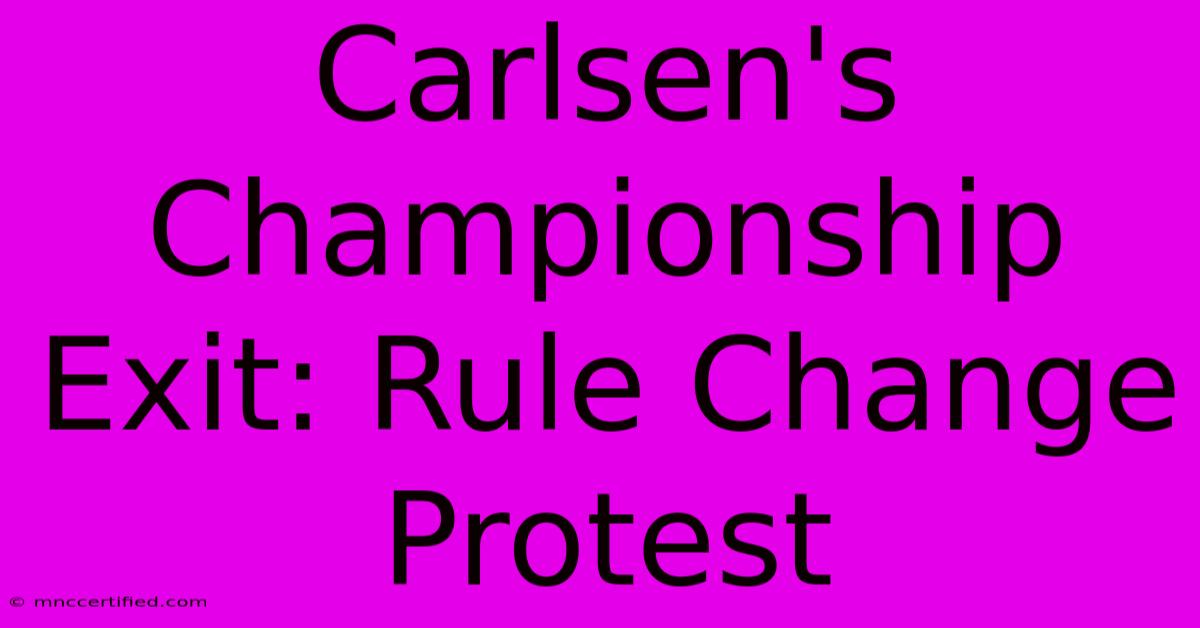Carlsen's Championship Exit: Rule Change Protest

Table of Contents
Carlsen's Championship Exit: A Protest Through Abdication?
Magnus Carlsen, the five-time world chess champion, shocked the chess world with his unexpected decision to relinquish his title. While he cited a lack of motivation, many believe his withdrawal is a thinly veiled protest against the current rules governing chess championships and the increasing prevalence of draws. This article delves into the potential reasons behind Carlsen's controversial move, examining the rule changes and the broader context surrounding his decision.
The Spark: A System Failing to Deliver Excitement?
Carlsen's reign was marked by dominance, but also by an increasing number of drawn games in championship matches. The current format, often criticized for prioritizing avoiding loss over aggressive play, arguably fails to deliver the nail-biting excitement chess fans crave. Many believe this format, coupled with specific rule changes, contributed to Carlsen's decision.
Drawn Games Dominate: A Systemic Issue?
The high frequency of drawn games has become a major point of contention. Critics argue that the current scoring system, which awards half a point for a draw, doesn't incentivize decisive play, leading to a proliferation of cautious, drawn games, even in high-stakes matches. This, in turn, diminishes the spectacle and excitement associated with world championship matches. Carlsen himself has been vocal about his dissatisfaction with this aspect of the game, suggesting it actively discourages the aggressive, attacking style that made him famous.
Rule Changes: A Catalyst for Change?
While not explicitly stated, some speculate that specific rule changes, perhaps concerning tie-break procedures or regulations around draws, may have further fueled Carlsen's discontent. Analyzing the specific rules implemented in recent years and their impact on gameplay could shed light on the potential underlying reasons for his protest. Further research into the specific rule modifications implemented since Carlsen's previous title defense is crucial in understanding this complex issue.
Beyond the Rules: A Deeper Look at Carlsen's Motivation
While the rules undoubtedly play a part, it's crucial to consider other factors influencing Carlsen's decision. Burnout, the immense pressure of maintaining a top position for so long, and a desire to explore other chess-related ventures could all have contributed to his choice. However, the timing of his announcement, coupled with his past criticisms of the game's structure, suggests a deeper, more principled reason might be at play.
The Pressure Cooker: Maintaining Dominance
The constant pressure to perform at the highest level, year after year, is immense. Carlsen's unparalleled success might have inadvertently created an environment where even victory felt less fulfilling, amplifying the frustration caused by the drawn games.
Exploring New Horizons: Beyond Competitive Play
Carlsen's influence extends far beyond competitive chess. His involvement in chess broadcasting, online content creation, and other chess-related projects may have shifted his priorities, making the commitment required for a world championship defense less appealing. This strategic move could also be seen as a pathway to further promote the game through alternative means.
The Impact: A Call for Reform?
Carlsen's resignation is more than just a personal decision; it represents a significant moment for the chess world. It has sparked a much-needed conversation about the format of world championship matches and the need for rule adjustments that encourage more dynamic and exciting gameplay. The impact of this bold move will likely be far-reaching, prompting discussions and potential reforms within the governing bodies of chess. His action could serve as a powerful catalyst for necessary change within the chess community.
Conclusion: A Legacy of Change?
Magnus Carlsen's decision to relinquish his title is a complex event with multiple contributing factors. While personal motivations like burnout and new pursuits are undoubtedly significant, the underlying issues with the current championship rules and the prevalence of drawn games cannot be ignored. His actions serve as a powerful call for reform, urging the chess community to reconsider the format and rules governing future championships to ensure a more exciting and engaging spectacle for players and fans alike. Only time will tell if his protest will lead to meaningful change, but one thing is clear: Carlsen's legacy will extend beyond his five world championships.

Thank you for visiting our website wich cover about Carlsen's Championship Exit: Rule Change Protest. We hope the information provided has been useful to you. Feel free to contact us if you have any questions or need further assistance. See you next time and dont miss to bookmark.
Featured Posts
-
Espn Carlsens Jeans Cost Him Tournament Spot
Dec 29, 2024
-
Carlsen Fide Tournament Exit Explained
Dec 29, 2024
-
Paul Bamba 35 Boxing Champion Dies
Dec 29, 2024
-
Watch Chargers Vs Patriots Game
Dec 29, 2024
-
Denchs Unseen Tribute To Maggie Smith
Dec 29, 2024